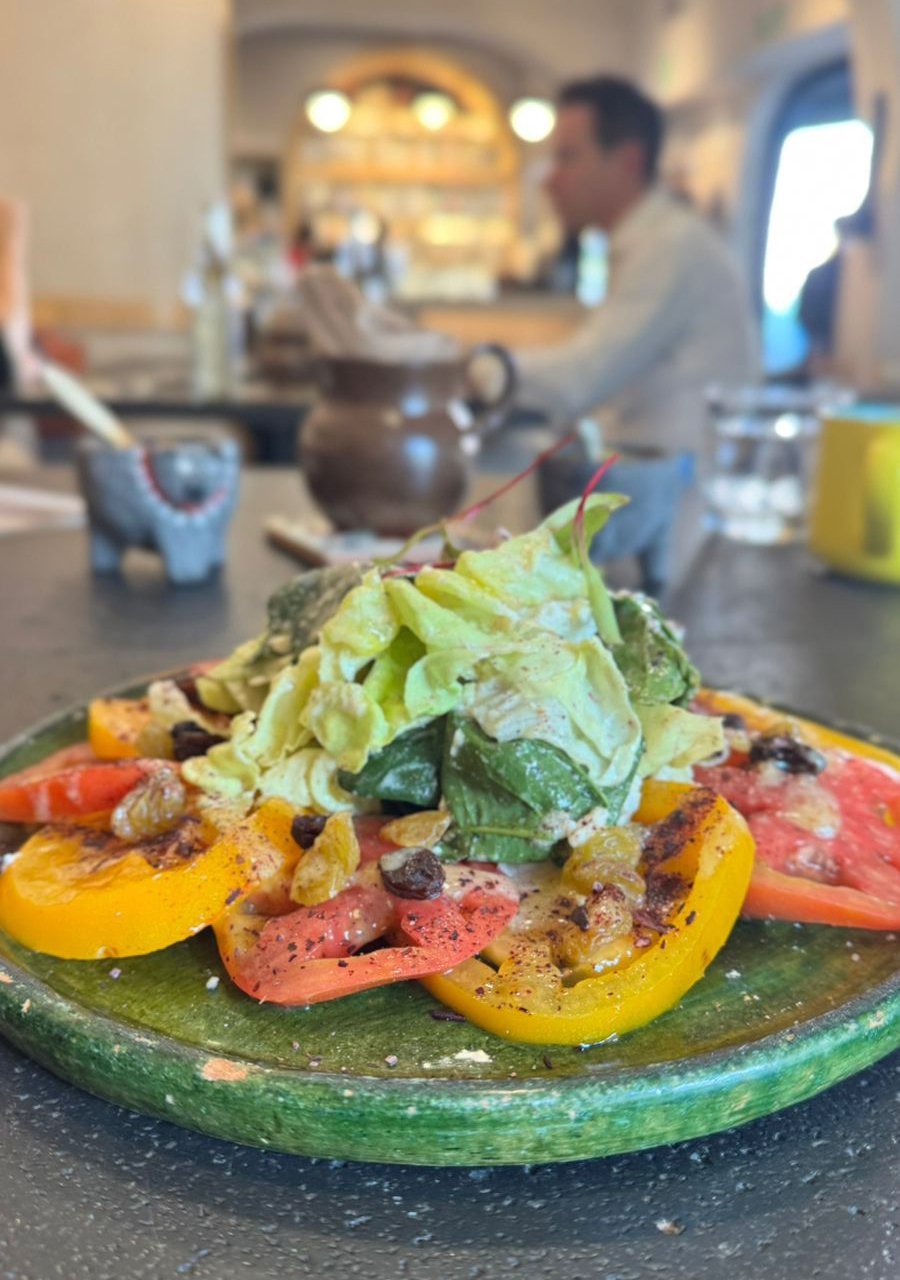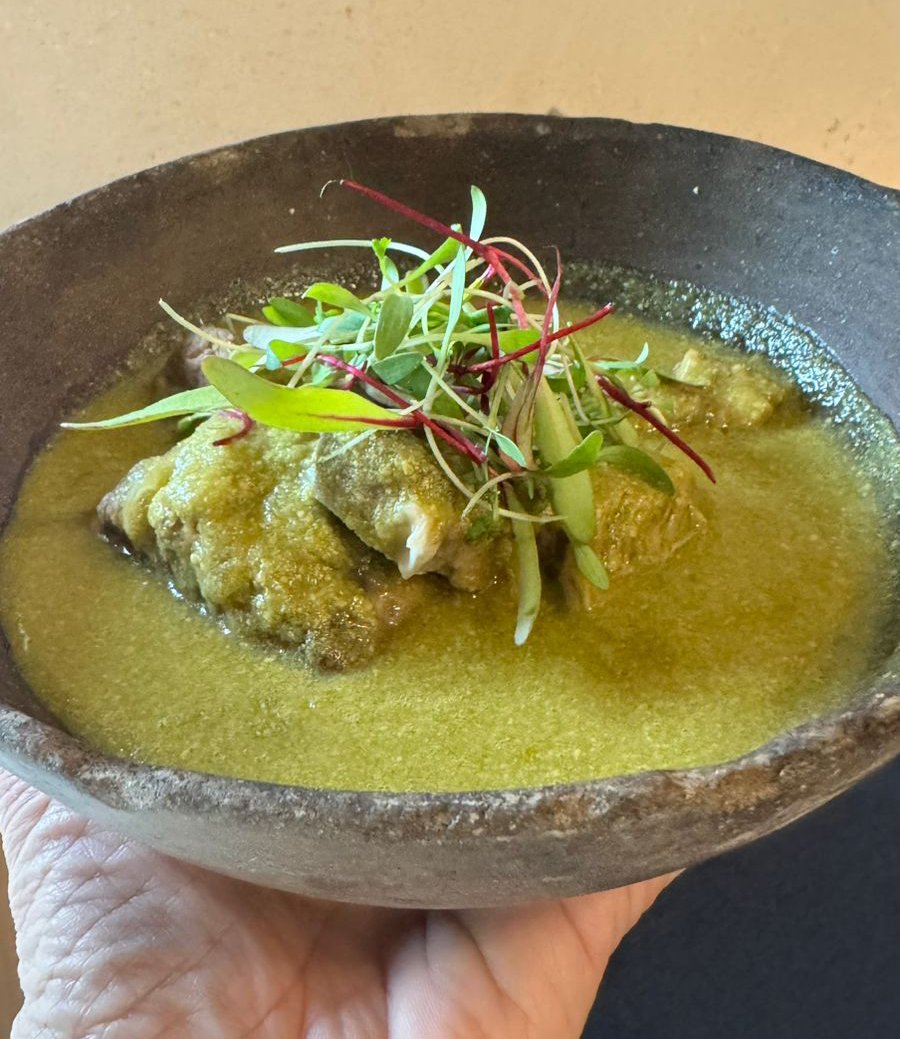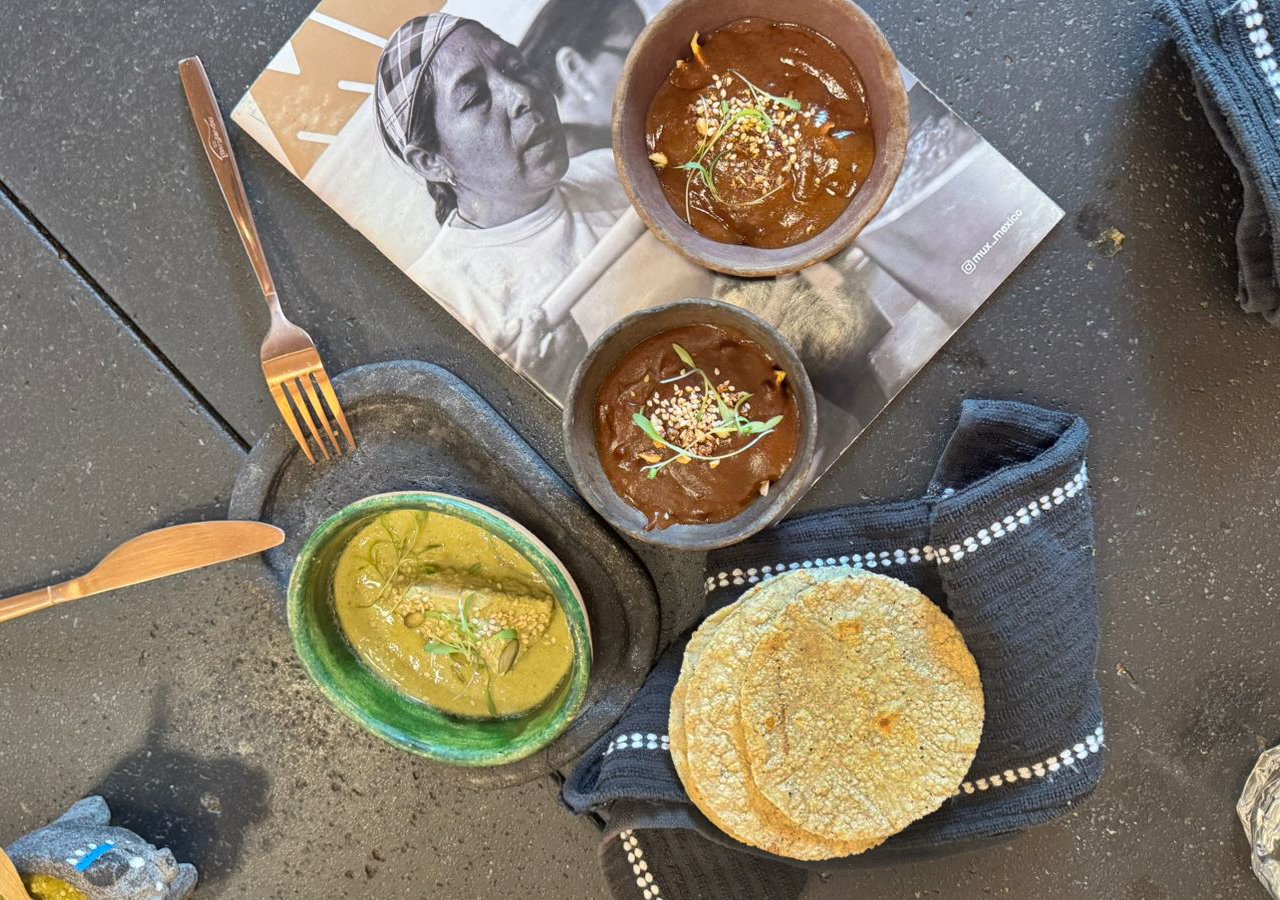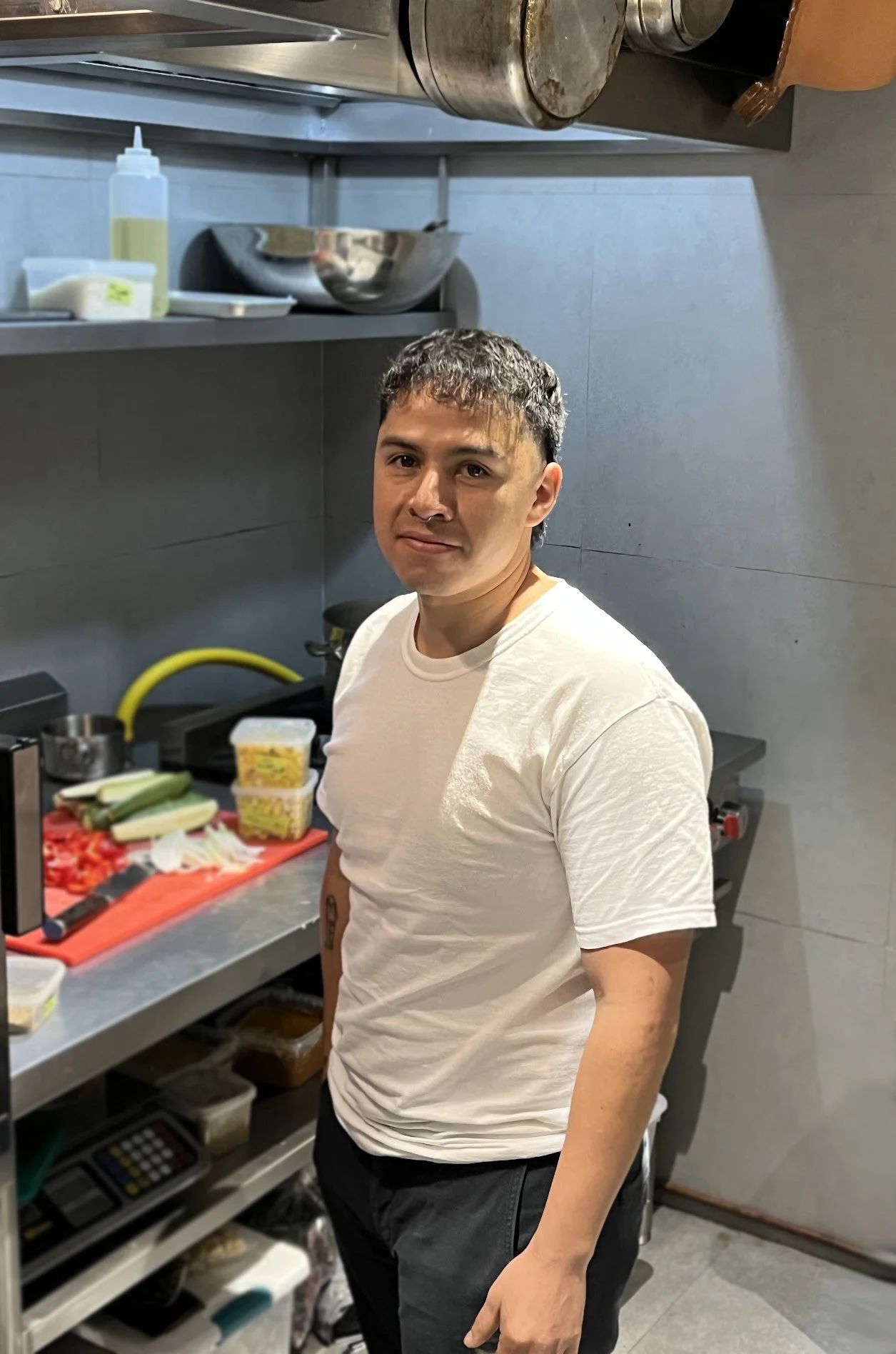Mux: Honoring the Soul of Tradition
I approach kitchens dominated by chefs with pronounced agendas with a certain wariness. Like Julia Child, I prefer to savor FOOD, not concepts. I want "good food," plain and simple. Thus, I entered Mux, which opened last year in La Roma, with a certain bias. The chef, Diana López, presents herself as something of a historian, an anthropologist, a sociologist—and yes, even a dogmatic pedagogue. Could such a figure, so ensconced in intellectual and cultural frameworks, cook food that would satisfy the tastes of someone like myself, or the discerning Mrs. Child? The answer is a resounding “yes”!
The concept behind Mux is one of intellectual rigor, where the culinary is fused with the scholarly. Chef López has, with commendable dedication, traversed the country, seeking out the living repositories of culinary tradition—chiefly the cocineras tradicionales, those invaluable non-professional cooks who are the true keepers of regional recipes. Since its opening, Mux has presented a series of four distinct temporadas, each a curated menu celebrating a particular region, not by the usual geographical markers, but by the cultural underpinnings that define it. These menus are not mere selections of dishes, but rather, carefully assembled studies in tradition, each one offering a window into the soul of a place through its flavors.
As of January 2025, the focus at Mux turns toward the Mixteca Poblana, and more specifically, the salinaros—the salt mines—of Zapotitlán. Here, a selection of dishes drawn from local cooks offers a direct connection to the land and its people. These recipes, each rooted in the use of specific salts harvested from the region, are not merely served but are offered as a tribute to their originators, who are named and honored on the menu. Presented either as a la carte options or as part of carefully crafted tasting menus, this is a culinary homage that, while rooted in the scholarly, never loses sight of the visceral pleasure of the table.
The menu itself is a handsome document, replete with explanatory texts that illuminate the dishes' provenance—a didactic gesture, to be sure, but one that enhances rather than diminishes the experience. For those inclined to bypass the historical and cultural context, the food itself remains, as it must, a pleasure to the palate: rich, distinctive flavors await.
The name Mux derives from a Mayan dialect, signifying "sacred point"—a reference to the singular texture that corn assumes once ground on the metate, the traditional stone grinder. It is corn that claims center stage here, its presence elevated with reverence, accompanied by a supporting cast of regional vegetables and herbs, each selected not only for its flavor but for its connection to place. Together, they form a harmonious ensemble, where the humble grain becomes the star, and the lesser-known ingredients serve as both contrast and complement.
The tomato salad at Mux
Tomates con sal de garambullo arrives at the table as a vibrant, composed salad of rainbow-colored tomatoes, drizzled with a vinaigrette made from fermented pulque. The exotic name, with its evocation of distant lands, belies a dish whose flavors are anything but unfamiliar—comforting, even, in their simplicity. One could easily imagine an Italian grandmother smiling with approval.
The salad, however, carries a deeper resonance, as its creator, Eloísa, is described with reverence: “She is a wise, silent, and beautiful soul, a sensible cook, and I can swear she has the gifts of a healer.” It is in this quiet wisdom that the dish finds its purpose, designed not for ostentation but for harmony. "This salad is to harmonize the discreet wisdom she shares with me," we are told. But it requires no introduction; its salt, along with mezcal-preserved garambullos—the cactus fruit that lends a unique tang—speak for themselves, offering a moment of both culinary and spiritual clarity.
What follows is a testament to that legacy. Tostadas, made from beautifully colored corns, are gently aromatic, their crispness complemented by the soft, creamy richness of quesillo con crema. Accompanying them are three salsas, earthy in flavor and redolent of the sun-baked landscape from which they come. Each bite transports you to the arid heart of the Mixtec region.
The tacos, filled with either chorizo blanco or longaniza, are similarly imbued with the fragrant perfumes of the land, garnished with fresh aromatics that lighten the richness of the meats. One taco, enjoyed on its own, could easily make for a satisfying lunch.
Las Tostadas at Mux
The main dishes at Mux are centered around several stews that, in their complexity and depth, resemble moles—though the menu cautions that the term mole here is not always as straightforward as one might assume. In this region, even a broth can be considered a mole. This is a cuisine unbound by convention, where the term mole transcends its familiar association with seeds and chiles, offering instead a broader, more nuanced understanding of flavor that reflects the diverse, layered nature of Mixtec gastronomy.
Guaxmole con res, a dish created by cocinera Fidela Enríquez Guzmán from the village of Atoyatempan, bears a striking resemblance to the more familiar mole verde, but with a notable distinction: it is thickened with guaje, the seeds of a tree. The result is a sauce that is at once astringent and deeply herbal, with a freshness that is both surprising and invigorating.
Then there is the chilatole de Cuyoaco, crafted by Mary Carmen Gonzales. This dish is a close cousin to mole de olla, but it stands apart in its sweetness and its milky texture. The bold flavor of meat and corn forms the heart of the dish, while molasses-like piloncillo adds a certain depth, and chipotle provides a smoky, spicy edge. The complexity of this dish mirrors its regional roots, where tradition and innovation intertwine.
Lastly, mole de Alaches—a soupy, fragrant creation from the wild Mixtec herb called alaches—was conceived by Rufina Cortés of Santo Tomás, Puebla. The alaches, with their peppery, citrusy bite and a faint echo of anise or mint from an herb called pipicha, create a refreshing, almost ethereal quality to the broth. The dish is a quiet marvel, a celebration of the region’s unique flavors and its deep connection to the wild, unspoiled earth.
Meals may be paired with a cocktail, a Mexican wine, or an artisan beer—each thoughtfully chosen to complement the flavors of the cuisine. The cocktails, in particular, strike a delicate balance between innovation and tradition, drawing deeply from the well of Mexican culinary heritage. One such creation is the canelita, a drink that blends rum, búlgaros (a type of fermented milk), and cinnamon, evoking the warmth and comfort of the traditional pajarete, a rustic drink of the Mexican countryside. Here, as with the food, the past is honored but never trapped in nostalgia; it is brought forward, reimagined, and made relevant to the contemporary table.
The décor at Mux is marked by a quiet elegance. Soft, sandy hues dominate the space, subtly punctuated by playful accents of red and navy blue. The minimalist design directs the eye to the details, most notably the burnished, unglazed pottery—handcrafted by artisans from Los Reyes Metzontla, Puebla—that adorns the room and appears at table. The ambient music is traditional, but more importantly, it remains discreet, obediently staying in the background, never intruding upon the experience.
Prices are reasonable: Lunch should cost around $3-400, the 5-course tasting menus (one vegan) are $1350, but that includes drink pairing with each course.
Culinary traditions are not born in the polished kitchens of high-end restaurants; they evolve organically, within the communities that nurture and sustain them. The high-minded ambitions of the modern kitchen may refine or reinterpret, but the soul of a tradition lies firmly rooted in the hands and hearts of those who live it. Mux does an admirable job of paying homage to these unsung custodians of tradition, honoring the essence of their craft without ever losing sight of its origins. It is a respectful acknowledgment, rendered not through imitation, but through genuine reverence.
Mux
Jalapa 189, Roma Nte. (see map)
Tel. 55 9039 6990
Open daily from 9 a.m.to 11 p.m.
Photos by @gastrotourdf









